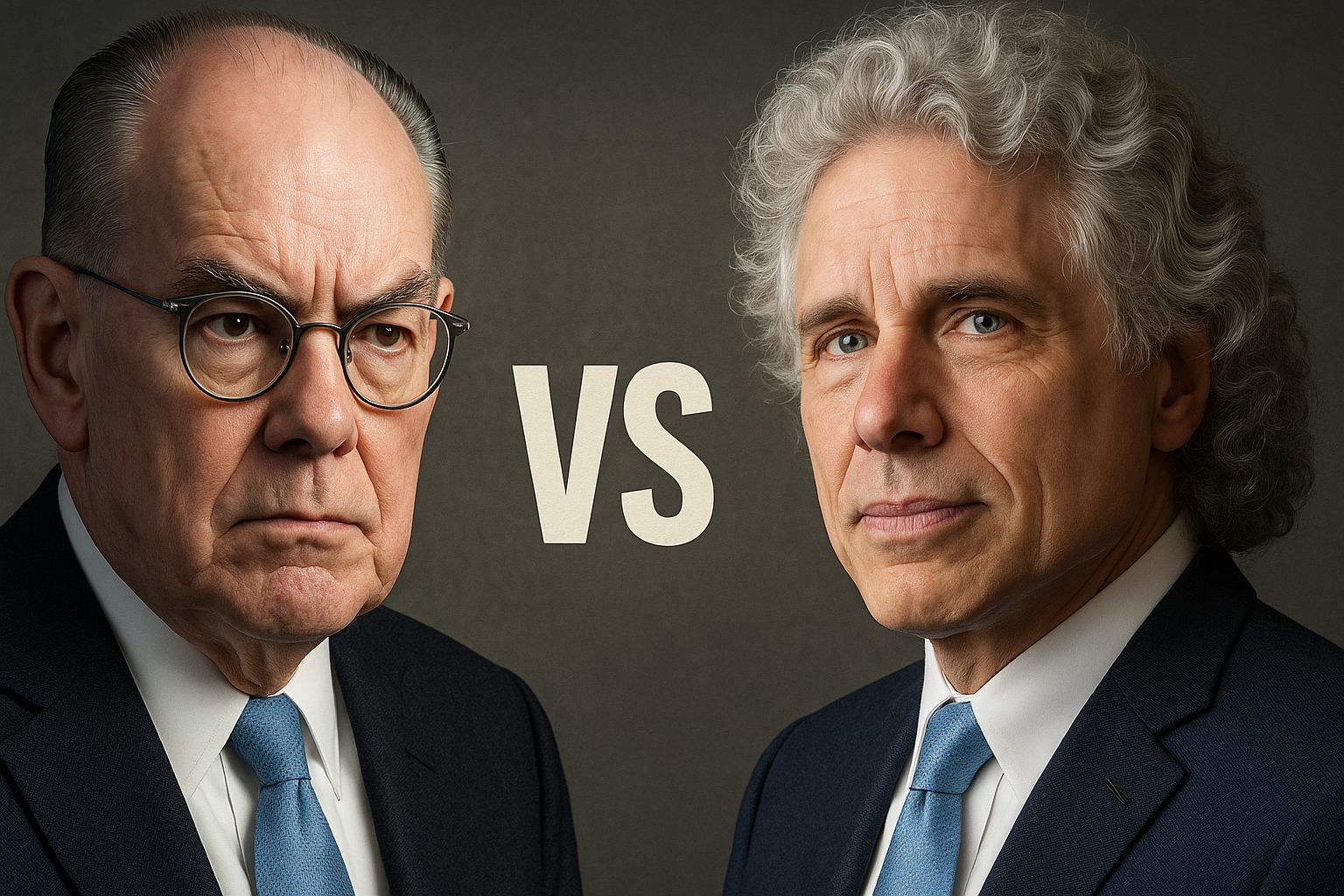What are the best ideals to guide human betterment—reason, tradition, or something else altogether? This was the animating question in a debate between psychologist Steven Pinker and international relations theorist John Mearsheimer, hosted by the Institute of Art and Ideas. John Mearsheimer is a leading figure in the realist school of international relations, particularly associated with offensive realism, a theory he formalized in his influential 2001 book The Tragedy of Great Power Politics. He argues that in an anarchic international system—where no central authority enforces rules among states—great powers are compelled to seek regional hegemony and maximize their relative power to ensure survival. This view contrasts with liberal internationalism, which emphasizes cooperation, institutions, and interdependence. Mearsheimer is also known for his skepticism of American liberal hegemony and military interventions aimed at spreading democracy, which he views as destabilizing.
Steven Pinker is a cognitive psychologist, linguist, and public intellectual best known for his defense of Enlightenment ideals—reason, science, humanism, and progress. A professor at Harvard University, Pinker has written extensively on language, the mind, and the trajectory of human history. In books like The Better Angels of Our Nature (2011) and Enlightenment Now (2018), he argues that empirical data shows humanity has become less violent, healthier, and more prosperous over time, largely due to the application of rationality and liberal democratic principles. Pinker's worldview is rooted in scientific optimism and secular humanism, and he often challenges both religious traditionalism and postmodern skepticism of reason and progress. While both participants are prominent intellectuals in their fields, their contrasting views on the legacy and trajectory of the Enlightenment reveal enduring tensions between optimism and realism, between the hope for consensus and the stubborn reality of political conflict.
Pinker defines Enlightenment values or ideals as the use of reason (which includes the open deliberation and evaluation of ideas, science, and history) to improve human flourishing. At the heart of Pinker’s case is a defense of Enlightenment ideals as the engines of moral and political progress in the modern age. For Pinker, these ideals are not antiquated relics of the 18th century, or mere Western cultural artifacts. Nor are they about exalting the West, since the West has at times been ambivalent in its commitment to Enlightenment ideals, given that counter-Enlightenment themes have had considerable influence.
In fact, the ideals that emerged following the Enlightenment are empirically vindicated principles that have shaped liberal democracies, expanded education and literacy, reduced famine, improved life expectancy, and curbed violence. Drawing on data-driven trends, Pinker argues that humanity has, by and large, been moving in the right direction—not through divine revelation or authoritarian command, but through the systematic application of reason. What, then, are the alternatives to Enlightenment ideals? Pinker identifies several: religion, which grounds morality in divine commandments; romantic nationalism, which venerates strong leaders and myths of historical greatness; struggle ideologies, which frame politics as zero-sum conflict between oppressor and victim groups; and reactionary worldviews, which seek to reject modernity and return to a mythical golden age.
Mearsheimer, in stark contrast, is more cautious and skeptical. Being a leading figure in offensive realism—a theory of international relations that views global politics as a perpetual struggle for power among states in an anarchic system—Mearsheimer does not deny that the Enlightenment produced important developments. But he questions whether it has delivered on the deeper promise of moral and political consensus. Enlightenment thinkers, he argues, believed that “unfettered reason” would lead to agreement on first principles, including the nature of justice, the good life, and the organization of society. In Mearsheimer’s view, this hasn’t happened—and likely never will.
Where Pinker sees convergence on liberal norms, Mearsheimer sees entrenched and irreconcilable differences and festering conflict based on identity and power. Reason, he argues, is not a neutral path to truth; it is frequently mobilized in defense of tribal and national identities. This is especially apparent in international relations, where even rational actors are locked into competition for power and security. The Kantian dream of “perpetual peace,” Mearsheimer insists, collapses under the weight of global realpolitik. No amount of rational deliberation can dissolve the fact that states often behave like survival-seeking actors, not moral philosophers.
Liberalism: Progress or Power?
A major fault line in the debate concerned liberalism—not only as a political system, but as a measure of progress. Pinker defines progress as improvements in human flourishing: health, longevity, peace, education, and equality. He acknowledges that these improvements overlap with liberal values, such as free expression, rights for women and minorities, and democratic institutions. But he argues for liberalism not because it is universally accepted, but because it delivers better outcomes: Pinker states that societies guided by Enlightenment values—particularly liberal democracies—are empirically the healthiest, safest, cleanest, happiest, and the most attractive destinations for global migrants. For him, these outcomes are not incidental but the consequence of systems that prioritize reason, rights, and open institutions.
Mearsheimer pushes back on this framing. He points out that liberal democracies have declined in number since the early 2000s, and that large segments of the global population actively reject liberal ideals. Can liberalism still be considered progress, he asks, if it fails to generate widespread agreement? More provocatively, Mearsheimer suggests that the global spread of liberal norms may be less a product of rational assent and more a consequence of Western—and especially American—hegemony. Just as political leaders in the Global South wear Western suits not because of their inherent rationality but because that is how one is “taken seriously” in a Western-dominated world, so too do nations adopt liberal institutions under pressure from powerful liberal states.
Therefore, the adoption of liberal democracy as the norm worldover is less a spontaneous outcome of philosophical agreement and wholehearted assent and more a strategic response to geopolitical realities. Liberalism, in this view, spreads not merely because it is rationally compelling, but because it has been historically backed by the economic, military, and cultural dominance of the West—first through European imperialism and later through American hegemony. Foreign aid, diplomatic recognition, trade partnerships, and security guarantees are often conditioned on adherence to liberal norms such as multi-party elections, market capitalism, or human rights. In most cases, liberal institutions are embraced not as universal truths, but as pragmatic necessities for survival and international respectability in a world where the rules are still largely written in the language of the Enlightenment.
This argument reveals a deeper critique: that Pinker’s optimistic empiricism may mistake the outcomes of power for the triumph of truth. By treating material improvements—declines in violence, increases in lifespan—as evidence of the Enlightenment’s moral legitimacy, Pinker risks deriving normative first principles from empirical trends. Mearsheimer contends that this move is philosophically flawed. First principles, he insists, are a priori and must be argued for directly—not inferred from statistical correlations.
Reason and Its Limits
Pinker readily acknowledges that reason can be used to entrench dogma as well as challenge it. But he maintains that reason, when institutionalized through democracy, science, and public deliberation, has a net tendency to improve the human condition. Though disagreement persists, it is no longer conducted in the shadow of the guillotine. Pinker is careful to distinguish between normative advocacy (what values we should endorse) and triumphalism (the idea that these values have already won in the intellectual debate of ideas). His claim is modest: that Enlightenment ideals have advanced human welfare and remain the best hope for doing so in the future.
Mearsheimer remains unconvinced. He argues that the Enlightenment overestimated reason’s unifying power. As long as individuals are born into tribes—into nations, religions, and historical communities—they will reason from within those frameworks, not from some detached rational standpoint. Political tribalism, he argues, isn’t a bug in the system; it’s a fundamental feature of human nature. Without agreement on first principles, politics becomes a “contact sport,” not a deliberative exercise. Progress, in this context, is elusive.
Defining Progress
One of the more illuminating moments in the debate came when the two men disagreed on what constitutes progress. Pinker sees progress in terms of outcomes—fewer famines, less torture, more education. Mearsheimer insists that true progress requires consensus on moral and political foundations. The fact that most people now agree that babies dying is bad, he says, isn’t a triumph of Enlightenment rationality; it is an obvious ethical intuition that predated modernity and consequently, the Enlightenment era.
This difference is more than semantic. It reveals two fundamentally different views of how human beings can optimise their existence—one emphasizes gradual improvement through open institutions, and the other emphasizes deep, enduring division rooted in identity and power. For Pinker, disagreement is a manageable and even productive part of a liberal democracy, and disagreement per se does not hinder progress. For Mearsheimer, unending disagreement is the reason why politics will always involve coercion, competition, and, sometimes even violence.
Conclusion
The debate between Steven Pinker and John Mearsheimer is pertinent because it raises deeper questions about the truth and universal applicability of Enlightenment ideals. Rather than simply contrasting optimism with pessimism, the discussion casts doubt on whether reason, liberalism, and human rights have spread because of their inherent moral or rational force—or because they have been backed by the geopolitical dominance of the West. Pinker defends the Enlightenment as a successful, empirically grounded project that has improved the human condition. But Mearsheimer challenges this view, suggesting that what appears as moral progress may in fact be a function of power, not truth. The global diffusion of Enlightenment values, particularly in the post-colonial world, has often occurred not through voluntary assent but through coercion, conditionality, or imitation. Even when observed through the most idealistic of lenses, the Enlightenment may not be the inevitable horizon of human reason, but is rather a historically contingent framework whose authority reflects the legacy of empire and the strategic interests of liberal hegemons. In this light, the debate is less about the Enlightenment’s promise, and more about its legitimacy—whether it represents a universal path forward, or merely the ideological veneer of a particular civilization’s rise to power.
At the end of the day, these binaries—between reason and tradition, optimism and realism, universalism and particularism—also reflect a deeper fracture in modes of knowledge production. The Enlightenment rests on a subject-object dualism that separates the knower from the known, privileging abstract reason and empirical data over empirical experience and ontological coherence. This epistemic orientation shapes not only ideas, but also political structures and institutions in the image of the Western worldview. In contrast, dharma, which rests at the centre and at the foundation of Indian Knowledge Systems (IKS), offers a radically different fulcrum—one that integrates metaphysics, ethics, and political order within a holistic framework. Where modern liberal theories are grounded in contractual individualism and rational utility, dharma is relational, contextual, and ontologically rooted. One of Bṛhat’s ongoing research projects seeks to reclaim this paradigm by formulating political theories based on our indigenous metaphysics—bridging the rift between knowledge and being, ethics and governance, and offering an alternative to the hegemonic structures of Enlightenment universalism.





